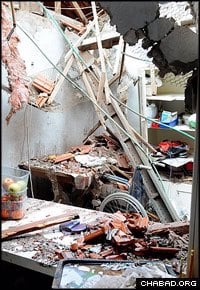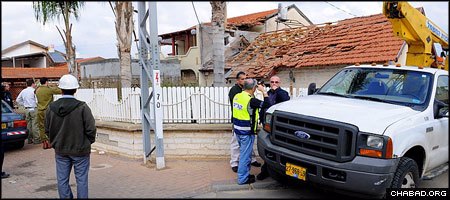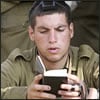The desert city of Be’er Sheva joined the list of Israeli towns struck by ever-improving Palestinian rockets Tuesday night, but in the midst of the chaos, at least one function continued as if the country’s latest offensive against the Gaza Strip had not landed smack dab on its doorstep.
At the Chabad-Lubavitch Center in downtown Be’er Sheva, Prof. Velvl Greene continued with his lecture, all while the Red Alert siren wailed in the background. It helped that the Chabad House also serves as one of the neighborhood’s shelters, but according to organizers, the mere existence of the gathering emphasized that Israeli citizens will continue with their lives as much as possible.
“Everyone realized that we were already in the shelter and that there was precious little more we could do,” said Greene, 78, a Chabad-Lubavitch Chasid and American transplant to Israel who is an expert on the nexus between Chasidic thought and science. “So everyone wanted to stay.”
Greene – the chair of epidemiology and public health and a professor emeritus at Ben-Gurion University, as well as director of the Lord Jacobovitz Center for Jewish Medical Ethics in Be’er Sheva – remembers being stuck in a sealed room during the First Gulf War. Consequently, Tuesday night’s bombardment was, for him, “quite routine.”
While Greene continued with his lecture, a group of 40 women met in an adjoining room for the first installation of a 14-week class on the Tanya, the foundation text of Chasidic thought penned by the first Chabad Rebbe, Rabbi Schneur Zalman of Liadi.
Many were understandably scared, but remained well after the attack to comfort each other and try to make sense of the situation.
“Some were hysterical,” said Ariella Adrei. “One woman even had an anxiety attack.”
After trying unsuccessfully to call their homes – the phone lines were down – the women recited Psalms and continued with their class, only to be interrupted a few more times by sirens.
Adrei, who first volunteered to organize the women’s classes for the Chabad House, now helps its directors, Rabbi Zalman and Bella Gorelik, maintain “the home-like atmosphere for Jews from every background and every age” in the midst of the crisis.

Making Home Out of a Shelter
Women’s classes did not take place Wednesday morning, so Adrei instead had mothers drop their children off at the center so that they could have some rest. Because of the security situation, military authorities have closed schools as far away as 40 kilometers from the Gaza Strip.
“There are 12 kids here,” said Adrei, 39. “We opened the library, we have videos going.”
She also made sure to have breakfast and snacks for anyone stopping by. Adrei said the children are doing great and trying to help out.
“When the kids saw me peeling vegetables,” she related, “they all wanted to help.”
Zalman Gorelik attributed the decision to close the schools as an act of Divine Providence that saved many lives. A rocket attack this morning struck a high school in the center of town where about 1,500 students would have normally been attending classes.
At the time of the attack, Gorelik had just finished passing out small books of Psalms to a group of soldiers and helping them don tefillin. He was heading to his car when he heard the alarm sound. He raced back into the building.
“The car was far, and I had to run,” related the rabbi. “I had maybe 60 seconds.”
For his part, Greene – who on Tuesday night was discussing the many letters he received between 1963 and the 1980s from the Rebbe, Rabbi Menachem M. Schneerson, of righteous memory – said that a postscript to one of the letters was especially relevant to the events of the past five days.
At the time the letter was written, Greene had asked the Rebbe – who frequently spoke about assurances from the Torah that the Land of Israel is under the constant protection of G‑d – about whether to send his daughter to seminary in Israel.
“My wife was a little frightened after the Yom Kippur War,” said Greene. “The Rebbe said, ‘Send her. She will be safe there.’ ”









Start a Discussion